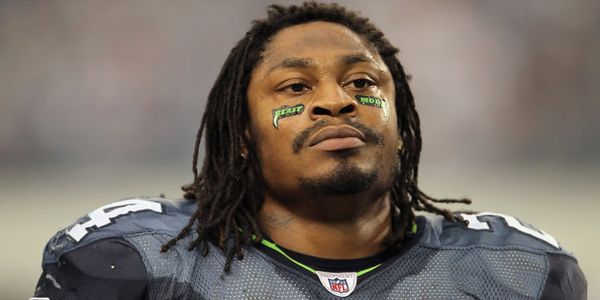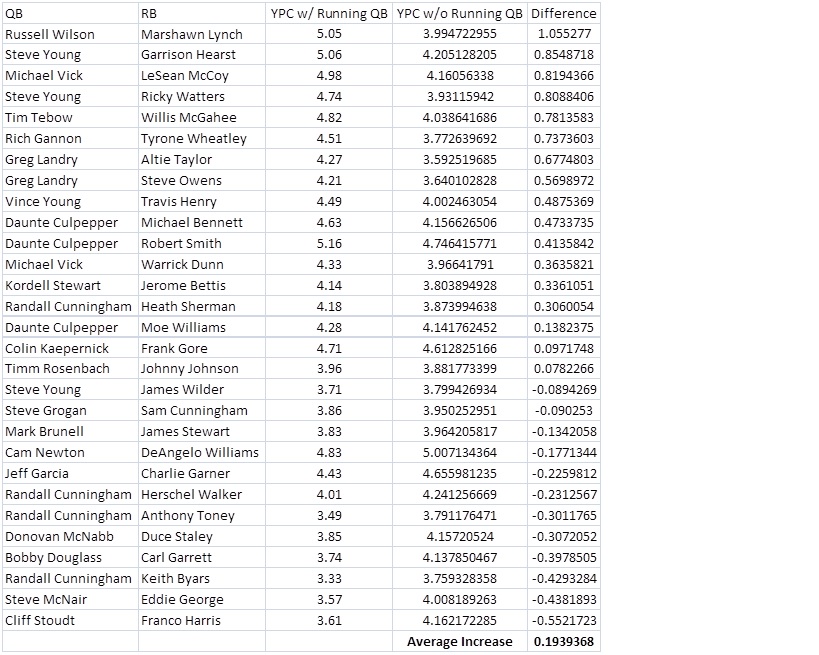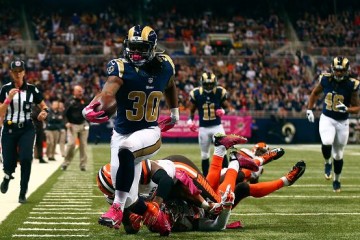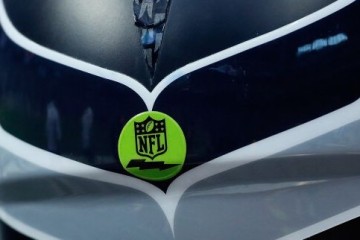2013 Fantasy Football: Do Running Quarterbacks Help Running Backs?


Source: Jeff Gross/Getty Images North America
Prior to last season Marshawn Lynch had averaged just under four yards per carry for his career, but last year he averaged over five yards per carry. Such a large shift absolutely baffled me. In my search for an answer, my first hypothesis was that Lynch improved thanks to better offensive line play in Seattle. And it turned out there was some truth to that. As I wrote about extensively in our Draft Guide (buy it here), Lynch benefitted from an extremely healthy and good offensive line as Seattle had their best four starters healthy almost all year.
Given the variance in health that NFL teams see from year to year, it’s not unreasonable to assume that Seattle’s line won’t be as good or as healthy this season. So I’ve been much lower on Lynch than any other ranker I’ve seen this preseason. But I’ve recently realized there may have been another factor that played into Lynch’s success last year that I had not considered.
I’ve also been down on Alfred Morris because I think that if RGIII misses games, Morris will not be the same back we saw last year. There is a pretty common narrative out there that quarterbacks who can run help their running backs. I guess the idea is that defenses have to stay home and contain when the quarterback can keep it himself, which opens up better running lanes for the running back. Despite my quickness to put Morris down because of concerns about Griffin’s health, it was duplicitous of me not to consider the fact that Russell Wilson may have also played a role in Lynch’s improvement.
But I wanted to make sure the narrative that running QBs help RBs wasn’t just a narrative. I wanted to see if there was any truth to it and, if so, how much. To answer that question, I first had to decide what qualifies as quarterback as a running quarterback. I asked Twitter how many yards per season a QB needed to be considered a running quarterback. The general consensus came back as about 400+ yards, which is the number I had in my head when I asked the question.
From there I compiled a list of all quarterbacks who have had 400+ rushing yards in a season (post-merger), which yielded a sample of 53 seasons. I then took a look at the leading running back on each one of those 53 teams. I wanted to compare their yards per carry when playing on a team with a running quarterback and their yards per carry when playing on a team without one. Some backs had multiple years in which they played with a running quarterback (i.e. Michal Vick and Warrick Dunn). In those instances I calculated the back’s YPC mark in all seasons with a running quarterback and all seasons without one.
Below is a chart showing the difference in yards per carry for each of the backs that played with one of those running quarterbacks less the backs who didn’t have at least 200 carries in seasons without a running quarterback.
Well that’s pretty inconclusive. Sure, there’s an average increase of two-tenths of a yard, which is not insignificant. But it’s far from conclusive that a running quarterback is going to have a positive impact, especially a huge impact, on a running back. And it’s not even like there’s a correlation between the quarterbacks with the most rushing yards and the biggest YPC increase for backs. For example, Newton has the 7th and 8th best rushing QB seasons of all time, but DeAngelo Williams averaged almost a couple tenths of a yard less per carry with Cam.
There could be other things going on here related to running quarterbacks. Some systems employed with running quarterbacks could be more beneficial to running backs than other systems (i.e. the zone read and/or zone blocking schemes). But it doesn’t seem that a running quarterback alone is a guaranteed positive for the running back.
The good news in all of this is that I can continue hating Marshawn Lynch. My hatred has been mitigated somewhat by the fact that the offensive line could stay healthy again, and even though Wilson might not have been as helpful as a full yard per carry increase, he could be helping. But it seems like everything went right for Lynch last year. The line couldn’t be any healthier this year, and Wilson couldn’t help any more. So there’s nowhere to go but down. Drafting Lynch in the top five or even third overall (which is his ADP on ESPN) is insane. There’s nothing but downside if you take him there. Of course, there’s no upside for anyone when you’re picking that high. But the idea is to draft as little downside as possible. And Lynch has more downside than anyone else in that top tier of backs.
To read more of my thoughts on Lynch as well as about 55,000 words written by other people, buy the 2013 TheFantasyFix.com and RotoAnalysis.com Fantasy Football Draft Guide.







2 Comments
Nice analysis but you missed the one thing that made the biggest difference. As Lynch himself said last year it was the first time he had a full back blocking for him. A blocking full back makes the single biggest difference in the running backs numbers. Without Max Strong, Shawn Alexander was just another running back, he knew how important Strong was, that is why he paid to take him to Hawaii every pro-bowl. Dunn’s numbers went down after he lost Alstott, Kick needed Larry Csonka for his numbers. So, I would say it is the addition of a blocking full back that makes the difference.
You literally gave zero reasoning of why people shouldn’t draft lynch in the top of the draft. You tried saying that it could be because he has a rushing QB but you proved to yourself that its a null point with that. You gave the reason that his offensive line was healthy last year so they could be unhealthy now this year? That’s not a sensible type of reasoning at all. I can say well Adrian Peterson was healthy last year so there’s a chance he might get hurt this year so I don’t think people should draft him 1st overall this year. But you or I would not say that because Peterson is a freak and no one is doubting him after last year. Fact is in his career, whenever Lynch has had over 250 carries in a season he has put up over 1,000 yards rushing (1,300 total yards, and 1,200 averaged rushing yards) and 7+ tds each of those seasons. So to think Lynch will have a bad year this year you must be saying he will have less than 250 carries on the year or he will get hurt, which both have no proof that will happen since Pete Carrol has fed and fed Lynch since he got there.